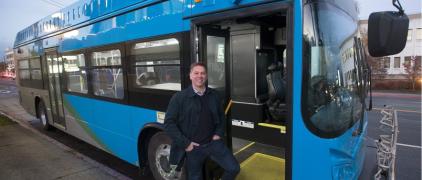
Source: Adrian Lam (Times Colonist)
While the use of electricity as an energy source for public transport is not new, a number of cities are envisioning the use of a new technology: all-electric battery-powered buses. Since the end of last year, the number of initiatives and trials has increased all over the world. Cities like New York and Abu Dhabi (city that just revealed a new all-electric bus just hours ago during the current Sustainability Week (ADSW) summit) are about to start their trials this year. Other cities like Frankfurt (23 units for the state of Hesse), Oslo (2 units), or Zielona Gora (Poland, 47 units), are already putting these all-electric buses (without the need of pantographs) into operation this year. Furthermore, leading cities such as Paris (with 30 units being added to the already 55 buses fleet), continue to increase the number of electric buses to their fleet and routes this year.
Nevertheless, nothing comes closer to this year’s Shenzhen city announcement: the full replacement of 16,000 buses by electric buses!
As part of China’s efforts to drastically cut greenhouse gases (GHG) emissions and smog pollution in major cities, and together with the local government support, subsidies to electric vehicles are bringing these buses in line with costs of regular buses. This is mainly due to their lower maintenance and operating costs, making electric buses a financially viable option in the long term.
This is not only good news for public transport users, who will be freed from loud noises and diesel exhaust at bus stops, but also a big boost for the local manufacturer, BYD (“Build Your Dreams”). Based in Shenzhen, BYD is the largest lithium-ion battery manufacturer, and since 2016 the largest electric vehicle manufacturer worldwide.
Last but not least, this is also good news for Canada and British Columbia, where TransLink in Vancouver and BC Transit in Victoria for example, have started their trials with the BYD electric battery-powered buses — in 2017 and January 2018, respectively. These cities were given electric buses from BYD at no cost for trials. We hope the results of these trials taking place in 2018 will be fruitful. We also hope that the cases mentioned above serve as good examples for other communities in BC and across Canada, inspiring them to continue to implement such technologies and to further innovate to reduce GHG emissions.